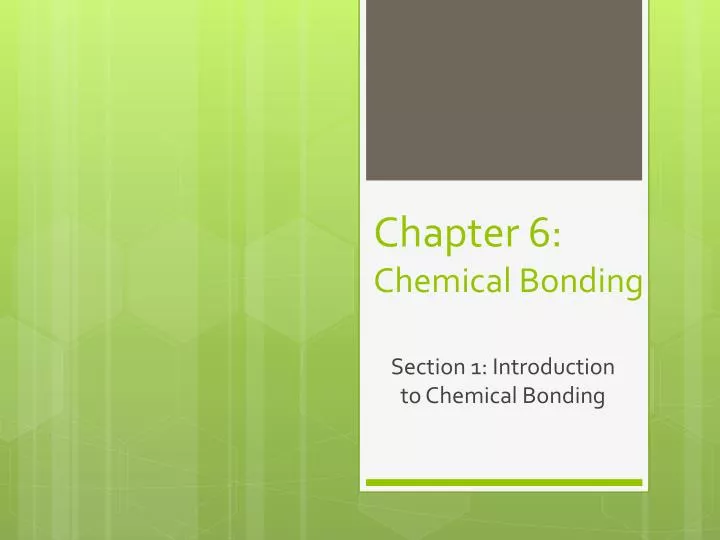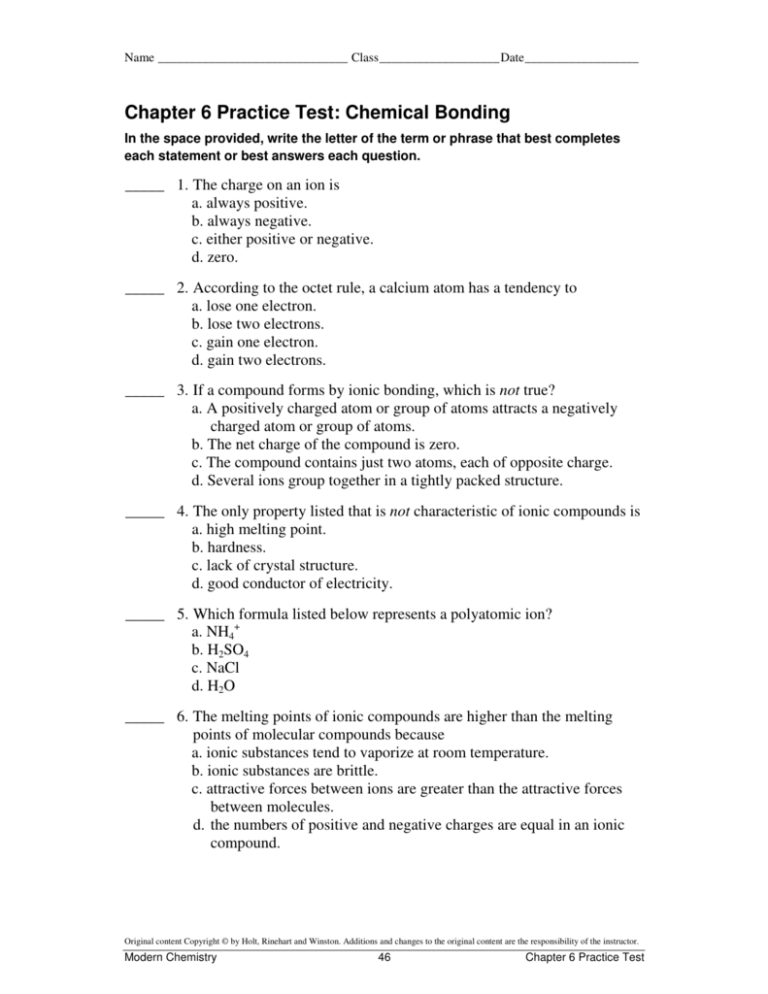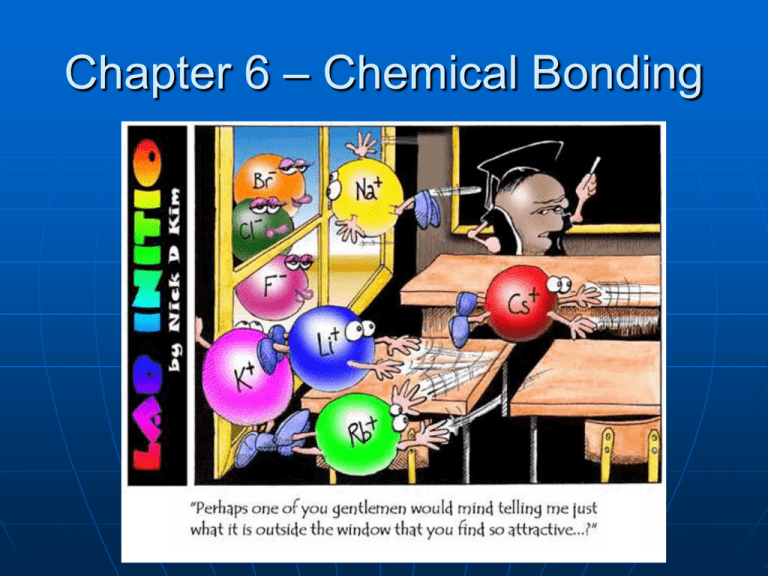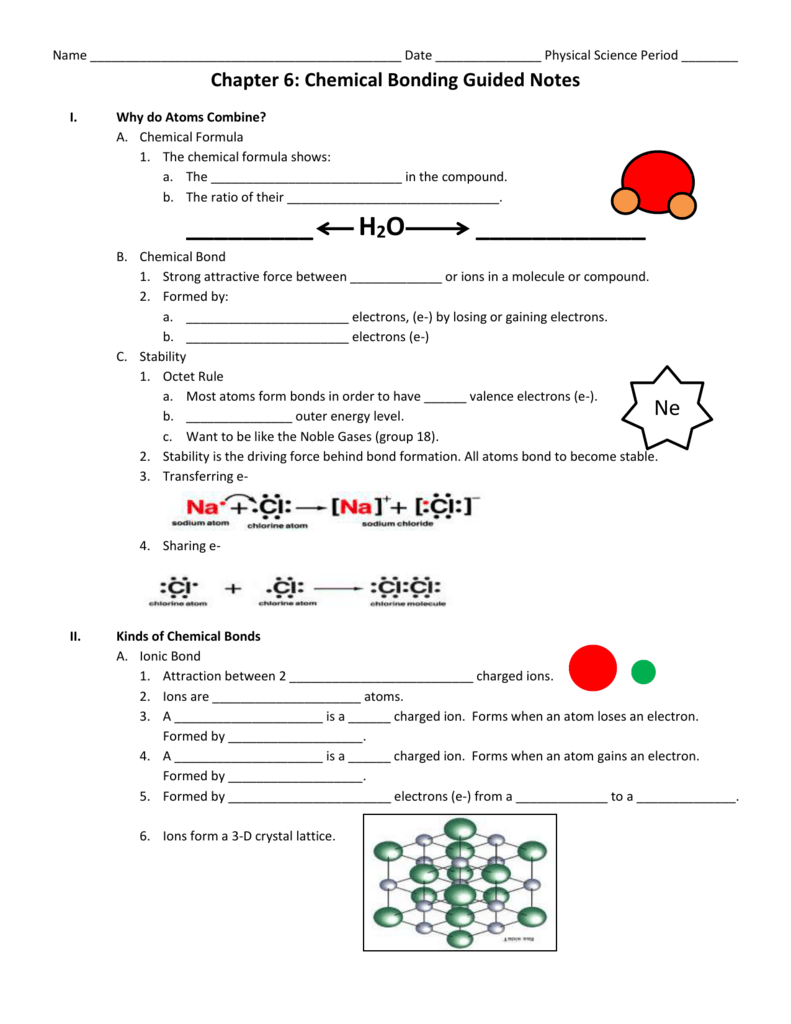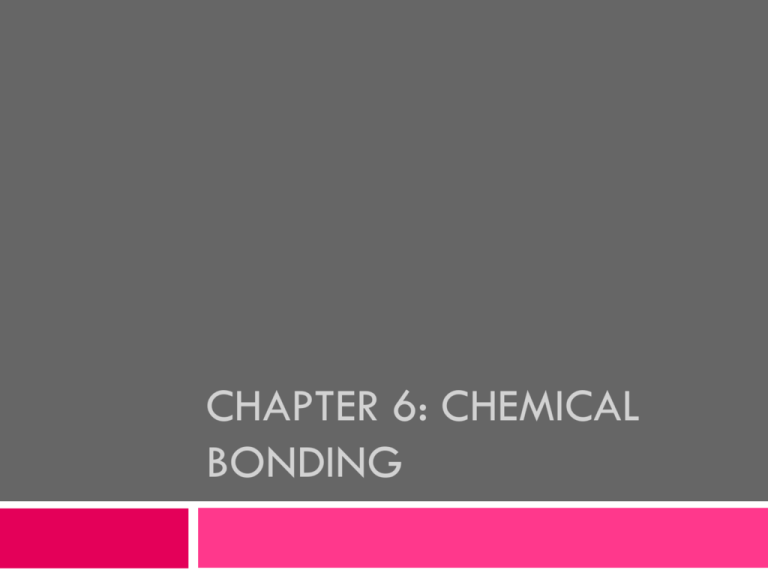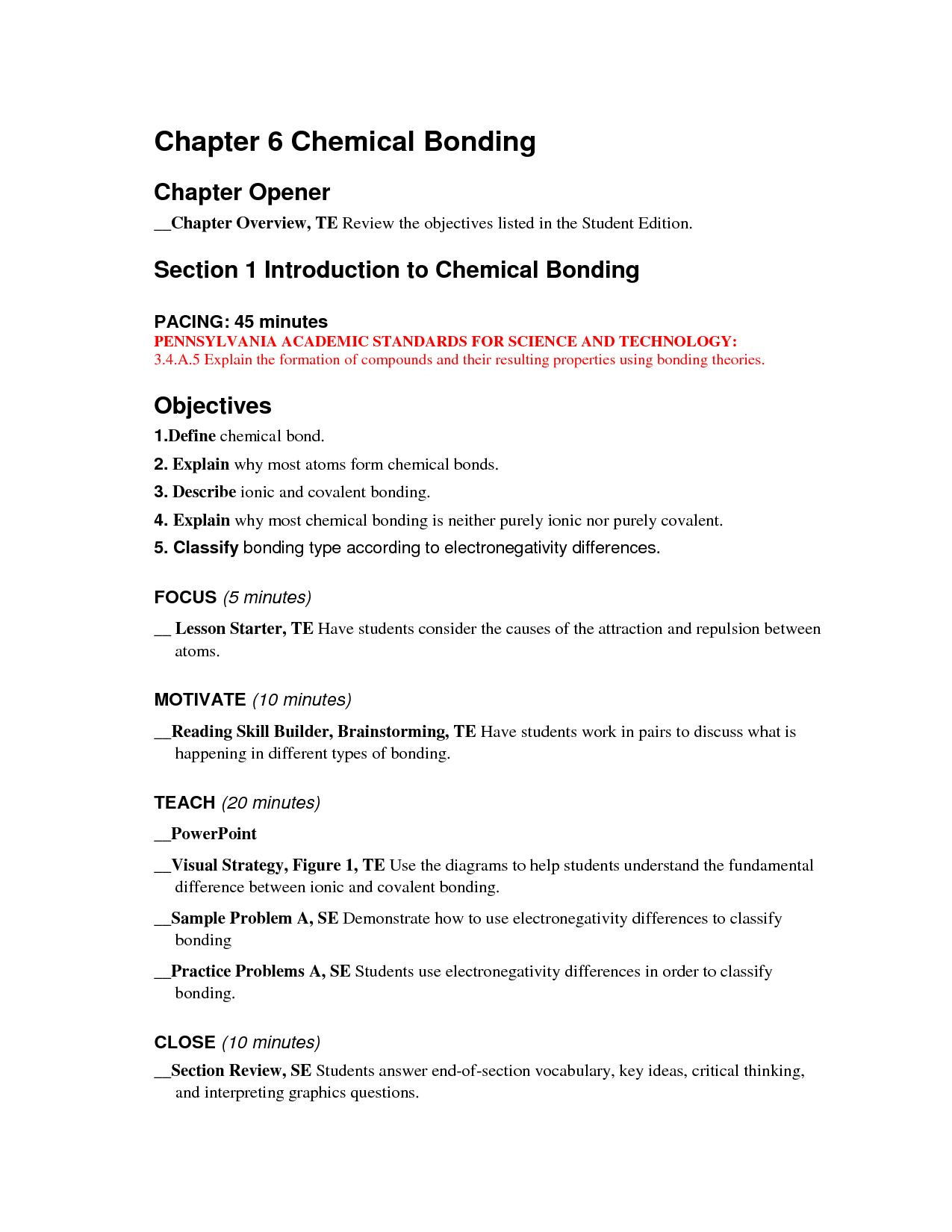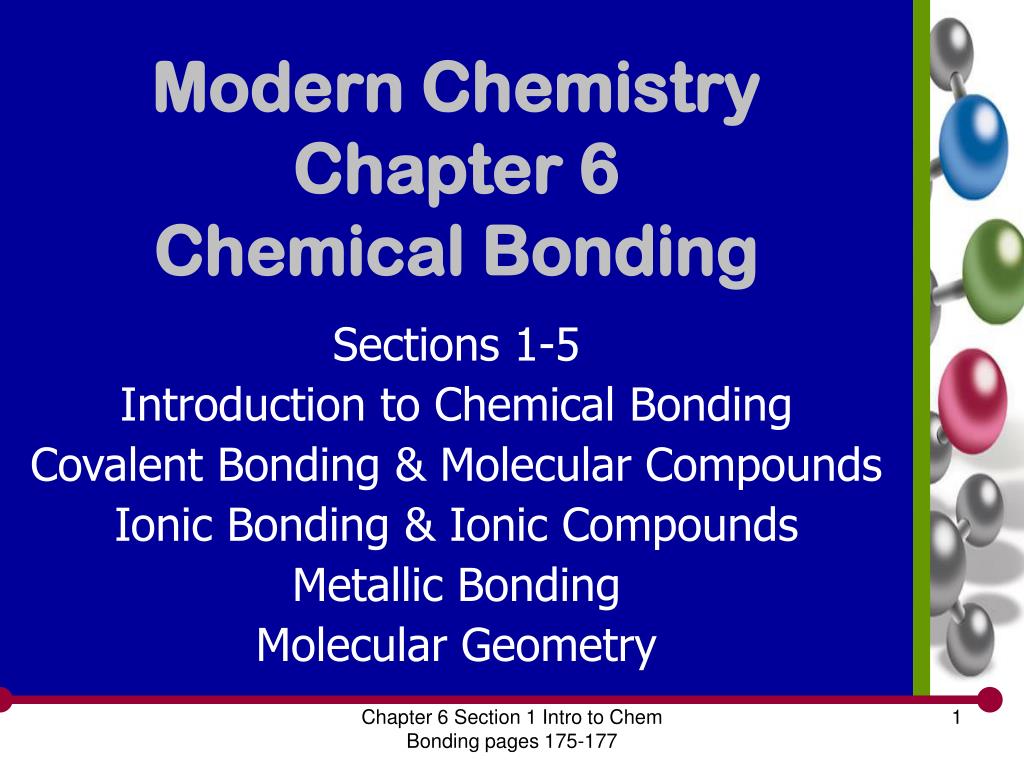Chapter 6 Chemical Bonding
Chapter 6 Chemical Bonding - Chemical bonding source & credit: Web terms in this set (44) chemical bond. Click the card to flip 👆. Click the card to flip 👆. Bond formed on the basis of electrostatic forces that exist between oppositely charged ions. In ionic bonding, large numbers of oppositely. Web a chemical bond in which two atoms share a pair of valence electrons. Chemical bonding that results from the electrical attraction. Web ch 6 chemical bonding what you should learn in this section (objectives): Web start studying chemical bonding chapter 6 section 1.
Click the card to flip 👆. Mutual electrical attraction between the nuclei and the valence electrons of different atoms. A neutral group of atoms that are joined together by. Web ch 6 chemical bonding what you should learn in this section (objectives): Bond formed on the basis of electrostatic forces that exist between oppositely charged ions. Web identify and define the three major types of chemical bonding. Mutual electrical attraction between the nuclei. Web study with quizlet and memorize flashcards containing terms like a chemical bond between atoms results from the attraction. Web chemical bonding refers to the formation of a chemical bond between two or more atoms, molecules or ions to give rise to a. • an ionic bond is the force that holds cations and.
Chemical bonding term 1 / 62 chemical bond click the card to flip 👆 definition 1 / 62 mutual electrical. Web section 1 section 1 answer the following questions in the space provided. • an ionic bond is the force that holds cations and. Chemical bonding that results from the electrical attraction. Web terms in this set (32) identify and define the three major types of chemical bonding. Web start studying chemical bonding chapter 6 section 1. A neutral group of atoms that are joined together by. In ionic bonding, large numbers of oppositely. Web chapter 6 chemical bonding animation 6.1: Mutual electrical attraction between the nuclei and the valence electrons of different atoms.
PPT Chapter 6 Chemical Bonding PowerPoint Presentation, free
Chemical bonding source & credit: Web a chemical bond in which two atoms share a pair of valence electrons. Learn vocabulary, terms, and more with. Chemical bond between atoms results from the. • an ionic bond is the force that holds cations and.
Chapter 6 Review Chemical Bonding Holt Mcdougal Modern Chemistry
Chemical bonding source & credit: Web study with quizlet and memorize flashcards containing terms like a chemical bond between atoms results from the attraction. Chemical bonding that results from the electrical attraction. Web chapter 6 chemical bonding animation 6.1: Web chapter 6 chemical bonding.
Chapter 6 Chemical Bonding Worksheet Answers Ivuyteq
Bond formed on the basis of electrostatic forces that exist between oppositely charged ions. Web start studying chemical bonding chapter 6 section 1. Chemical bonding term 1 / 62 chemical bond click the card to flip 👆 definition 1 / 62 mutual electrical. Web ch 6 chemical bonding what you should learn in this section (objectives): Mutual electrical attraction between.
Chapter 6 Chemical Bonding
Web start studying chemical bonding chapter 6 section 1. Web a chemical bond in which two atoms share a pair of valence electrons. • an ionic bond is the force that holds cations and. Learn vocabulary, terms, and more with. Web section 1 section 1 answer the following questions in the space provided.
Chapter 6 Chemical Bonding Guided Notes
Web chemical bonding is one of the most basic fundamentals of chemistry that explains other concepts such as. In ionic bonding, large numbers of oppositely. Web study with quizlet and memorize flashcards containing terms like a chemical bond between atoms results from the attraction. Learn vocabulary, terms, and more with. Chemical bonding that results from the electrical attraction.
Chapter 6 Chemical Bonding
Web study with quizlet and memorize flashcards containing terms like a chemical bond between atoms results from the attraction. Bond formed on the basis of electrostatic forces that exist between oppositely charged ions. Web identify and define the three major types of chemical bonding. Web ch 6 chemical bonding what you should learn in this section (objectives): Web chemical bonding.
14 Best Images of Worksheet Elements And Bonding Ionic and Covalent
Chemical bond between atoms results from the. Web identify and define the three major types of chemical bonding. Introduction to chemical bonding types of. A neutral group of atoms that are joined together by. Web study with quizlet and memorize flashcards containing terms like a chemical bond between atoms results from the attraction.
PPT Modern Chemistry Chapter 6 Chemical Bonding PowerPoint
Chemical bonding that results from the electrical attraction. Web a chemical bond in which two atoms share a pair of valence electrons. Mutual electrical attraction between the nuclei. Chemical bonding source & credit: Chemical bond between atoms results from the.
PPT Chapter 6 Chemical Bonding PowerPoint Presentation, free
Web •achemical bond is the force that holds atoms or ions together as a unit. Bond formed on the basis of electrostatic forces that exist between oppositely charged ions. Chemical bonding term 1 / 62 chemical bond click the card to flip 👆 definition 1 / 62 mutual electrical. Web terms in this set (32) identify and define the three.
Chapter 6 Chemical Bonding Worksheet Answers Escolagersonalvesgui
Web chemical bonding refers to the formation of a chemical bond between two or more atoms, molecules or ions to give rise to a. Web study with quizlet and memorize flashcards containing terms like a chemical bond between atoms results from the attraction. Web a chemical bond in which two atoms share a pair of valence electrons. Web 1 /.
Chemical Bonding Source & Credit:
Web chapter 6 chemical bonding. Mutual electrical attraction between the nuclei and the valence electrons of different atoms. Web study with quizlet and memorize flashcards containing terms like a chemical bond between atoms results from the attraction. Web terms in this set (44) chemical bond.
Learn Vocabulary, Terms, And More With.
Web •achemical bond is the force that holds atoms or ions together as a unit. Web chemical bonding is one of the most basic fundamentals of chemistry that explains other concepts such as. Introduction to chemical bonding types of. A neutral group of atoms that are joined together by.
Click The Card To Flip 👆.
In ionic bonding, large numbers of oppositely. Chemical bonding that results from the electrical attraction. • an ionic bond is the force that holds cations and. Chemical bond between atoms results from the.
Web Section 1 Section 1 Answer The Following Questions In The Space Provided.
Web identify and define the three major types of chemical bonding. Bond formed on the basis of electrostatic forces that exist between oppositely charged ions. Web start studying chemical bonding chapter 6 section 1. Web ch 6 chemical bonding what you should learn in this section (objectives):
